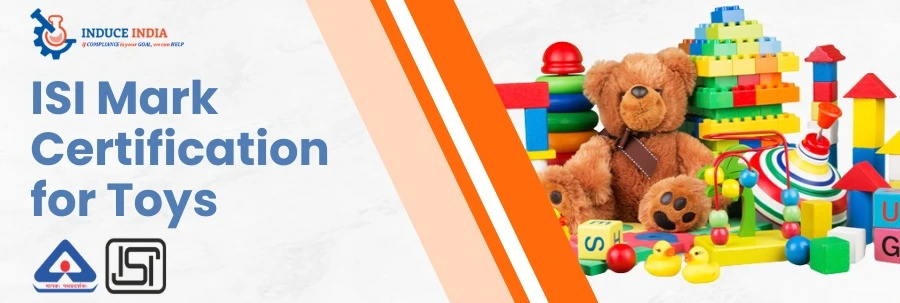In this blog, we discuss about ISI Mark Certification as per the Indian Standards specified by Bureau of Indian Standards, Govt. of India. If you are a manufacturer or importer this is important for you.
Understanding the Importance of ISI Certification for Toys
This isn’t just another “good to have” certification. The ISI mark serves as a hallmark guaranteeing the safety of your playtime buddies. It’s like having a superhero cape for your toys, empowering, and protecting them. Ensuring safety standards, the ISI certification uplifts the trust a consumer places on your product, and it becomes your silent ambassador in the marketplace.
Overview of ISI Certification
Spanning from the Indian Standards Institute, it operates under the umbrella of the Bureau of Indian Standards (Standard body of Indian government). This sheriff in town governs the quality aspect of products available to Indian consumers.
It involves meeting predefined standards, thorough testing, and excellent manufacturing practices, all woven together to ensure that your toys are safe for all little Tykes across the nation.
Standards covered for Toys
| Non-Electric Toys | |
| IS 9873 (Part 1): 2019 | Safety of Toys Part l Safety Aspects Related to Mechanical and Physical Properties |
| IS 9873 (Part 2): 2017 | Safety of Toys Part 2 Flammability |
| IS 9873 (Part 3): 2017 | Safety Requirements for Toys Part 3 Migration of Certain Elements |
| IS 9873 (Part 4): 2017 | Safety of Toys Part 4 Swings, Slides and Similar Activity Toys for Indoor and Outdoor Family Domestic Use |
| IS 9873 (Part 7): 2017 | Safety of Toys Part 7 Requirements and Test Methods for Finger Paints |
| IS 9873 (Part 9): 2017 | Safety of Toys Part 9 Certain Phthalates Esters in Toys and Children’s Products |
| Electric Toys | |
| IS 15644: 2006 | Safety of Electric Toys |
Why should Toy Manufacturers Get ISI Certification?
Both types of manufacturers of toys who come under FMCS or Domestic must have BIS ISI Certification to sell their products in the Indian market.
BIS ISI certification guarantees that the products meet specified quality standards. When you get BIS Certification you are allowed to adhere to the ISI mark on your products which assures the quality of the products, safety, market access, competitive advantage, and legal compliance.
The Essential Standards Your Toys Must Meet
These standards aren’t just arbitrary. These include complying with mandatory toy safety regulations and undergoing stringent quality checks. We are talking about the mechanical, physical, and chemical tests.
ISI Marking
Along with the ISI mark the following details have to be given in the packaging of finished good
Compliance with Indian standard specifications must be observed during the marking, labeling, and packaging process. Furthermore, the product may bear the BIS Standard Mark for added assurance.
- Identification and classification
- Net mass of each package (with serial number)
- Lot/batch number
- Transportation, handling, storage specifications, and consignment of proper cases.
ISI Mark Certification Process for Toys
Obtaining ISI Mark Certification for your product involves a series of steps and compliance with specific guidelines set by the Bureau of Indian Standards (BIS). Here’s an overview of the process:
- Documentation
- Application Submission
- BIS Audit
- Sample Testing
- Grant of License (within 5-10 days)
The procedure for BIS ISI Mark Certification is different for Domestic Manufacturers and Foreign Manufacturers. To see detailed information about procedure for ISI Mark Certification visit ISI Mark Certification for Domestic Manufacturers and ISI Mark Certification for Foreign Manufacturers.
Required Documents for FMCS ISI Mark Certification
Due to the recent implementation of the BIS online application system for information gathering and management, the documentation aspect of the FMCS system for BIS is relatively uncomplicated.
- Proof of factory or company registration documentation.
- A flowchart detailing the manufacturing process.
- Information about on-site manufacturing capabilities and, if applicable, any outsourcing arrangements for manufacturing.
- Documentation demonstrating the presence of adequate testing infrastructure.
- Records of quality control (QC) metrics and their historical data.
All required documents, including the test and inspection schedule, annual labeling charge, laboratory product test report, and any other data complying with BIS standards, are accessible upon request from BIS. The complete list of documents is available upon inquiry.
To see detailed information, you can visit here.
Required Documents for ISI Mark (Domestic) Certification
- Premises Documents
- GST Certificate
- MSME Certificate
- Test certificate copy of each raw material
- Process Flow Chart
- Layout plan of the factory indicating the office, lab storage area, production area, etc.
- List of manufacturing machinery.
- List of raw materials.
- List of testing equipment.
To see detailed information, you can visit here.
Marketing Your Certification: Making Your Safety Standards Known
Getting an ISI mark is like giving your toys their very own spotlight. Don’t be shy about announcing it. Ensure to flaunt the ISI mark in your marketing materials, showcasing your standards. Remember, this seal of approval is not just to rest on your laurels, but to take your brand to newer horizons.
Building Consumer Confidence: How ISI Certification Benefits Your Brand
Displaying ISI mark on your product increases the trust of consumers in the market. It generates unwavering consumer trust and gives your brand a significant boost. Not only does it act as a seal of safety, but also works as your silent brand ambassador.
Staying Ahead of the Competition: Leveraging Your Certification for Advantage
This isn’t just a badge; it’s an advantage that sets you apart from your competitors. It gives your shoppers that extra bit of reassurance because they know they’re buying products that are credible and safe.
Conclusion:
Mandatory BIS certification for Toys is essential to ensure the quality and safety of these products. Obtaining BIS certification not only facilitates market access but also provides a competitive advantage and peace of mind to manufacturers and consumers alike.
It’s often beneficial to consult with BIS Consultants, such as INDUCE INDIA, to navigate the complex certification process effectively.
These consultants can provide guidance, and assistance with documentation, and help you understand the specific requirements of the ISI certification process, ensuring that your application is complete and meets all necessary criteria. For more information feel free to contact us call at +91-7503304082 or email at [email protected]
Frequently Asked Questions
Let’s see the FAQ section that can answer some of your questions. Let’s delve into more details about ISI Mark Certification for toys.
Typically, it'll take about 4-6 months. But remember, it's worth the wait.
Let's just say, it's not a pleasant scene. Violations of the standards can lead to cancellation of your certification and a few legal consequences. So remember, Compliance is key.
Retesting happens during regular surveillance by BIS officials. It's a way to ensure your toys continuously meet the high standards set by Bureau of Indian Standards.



